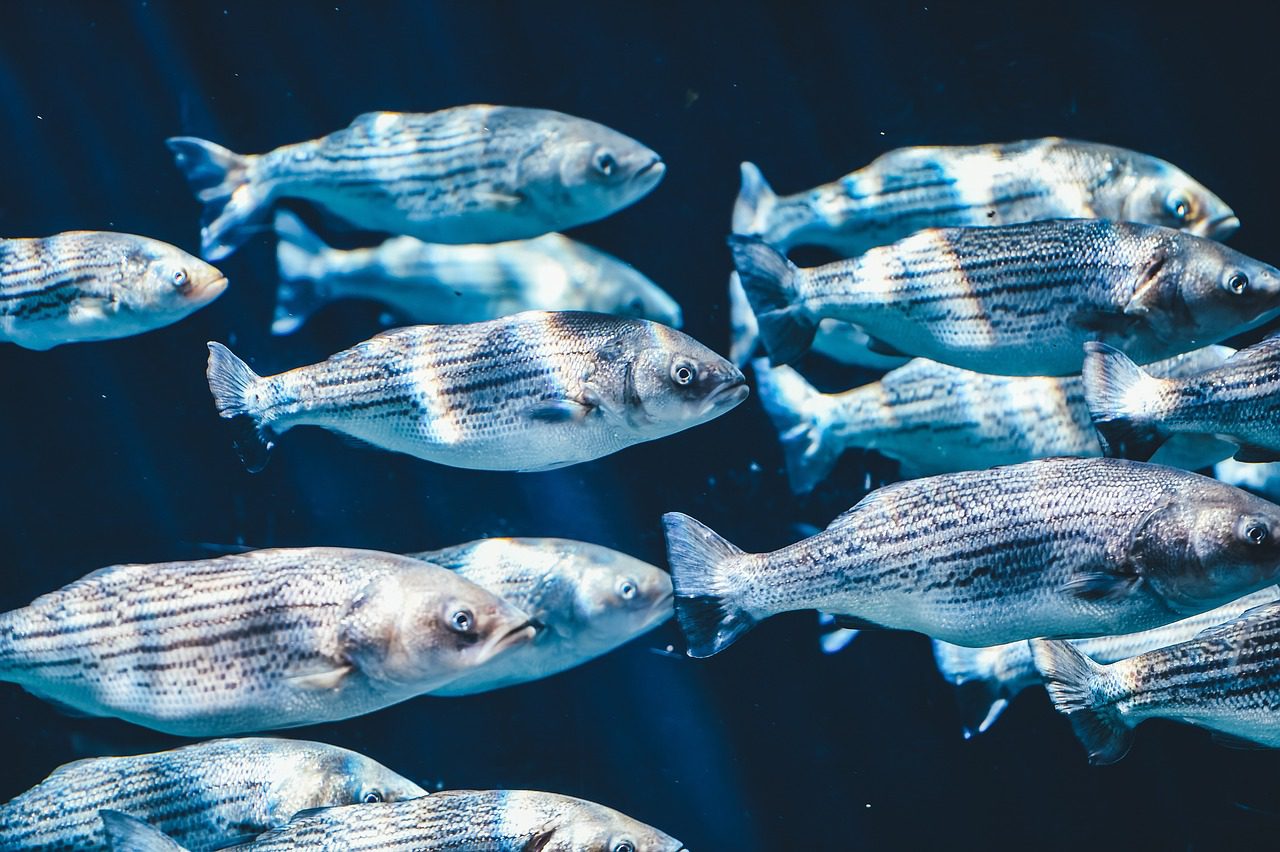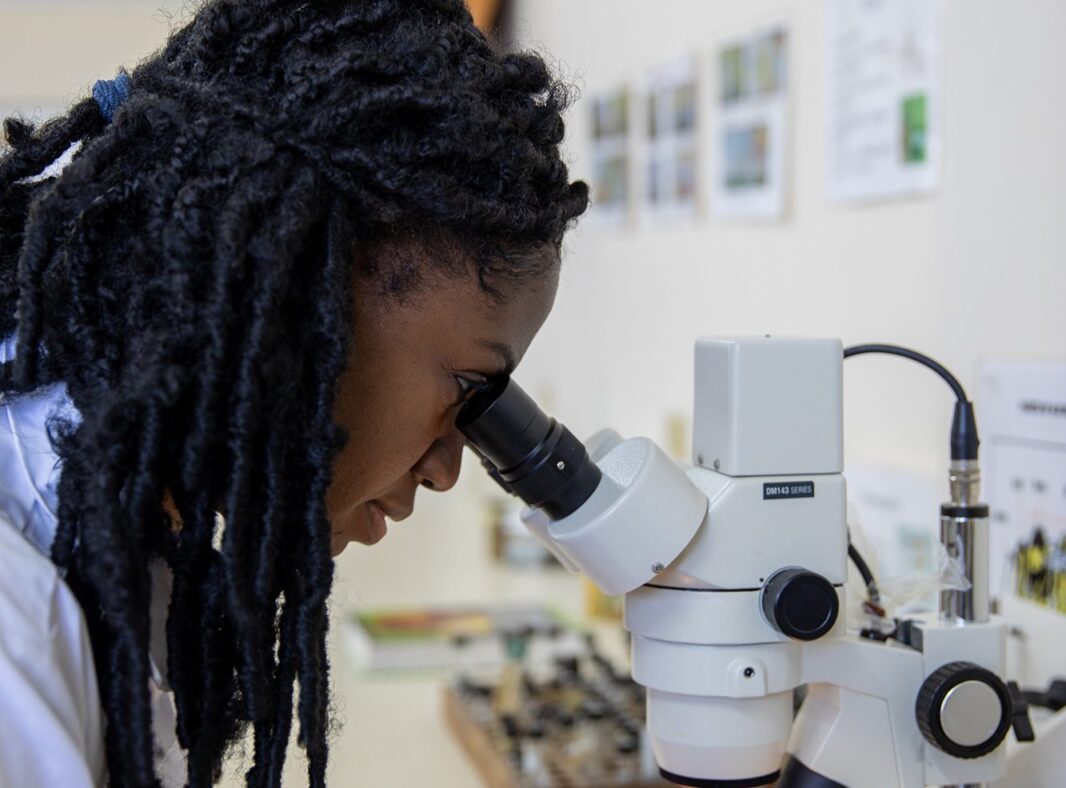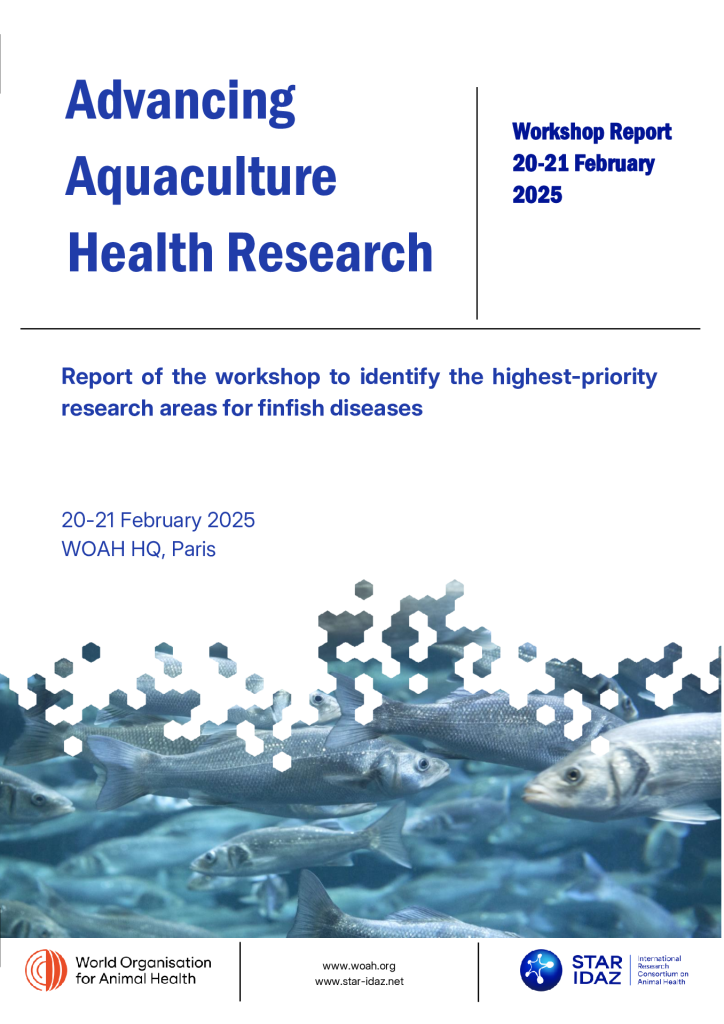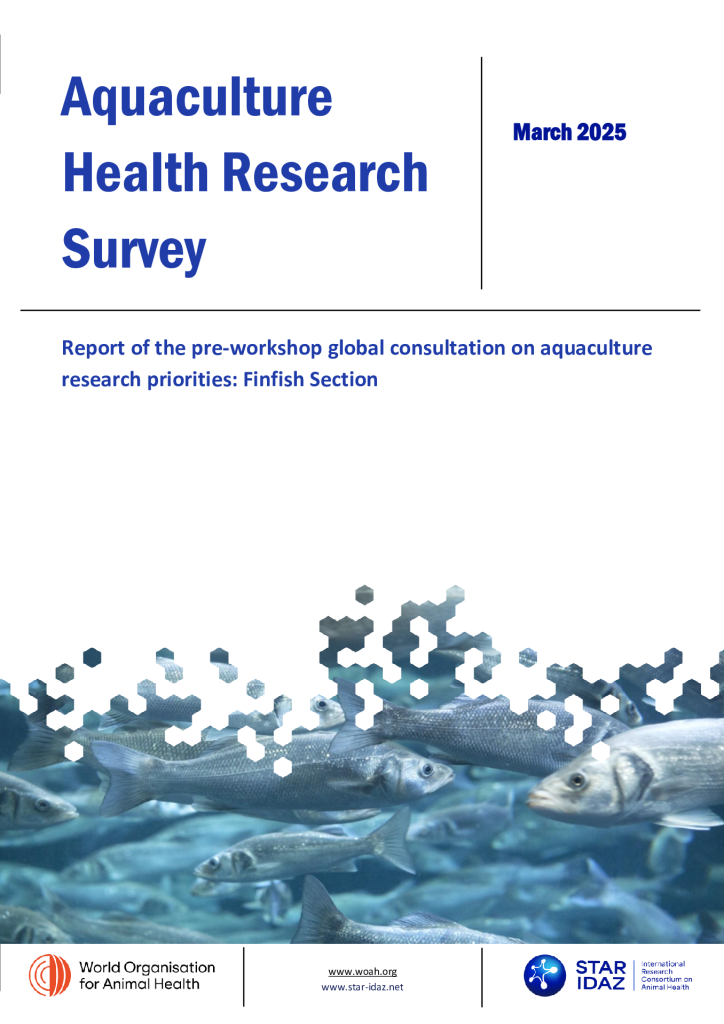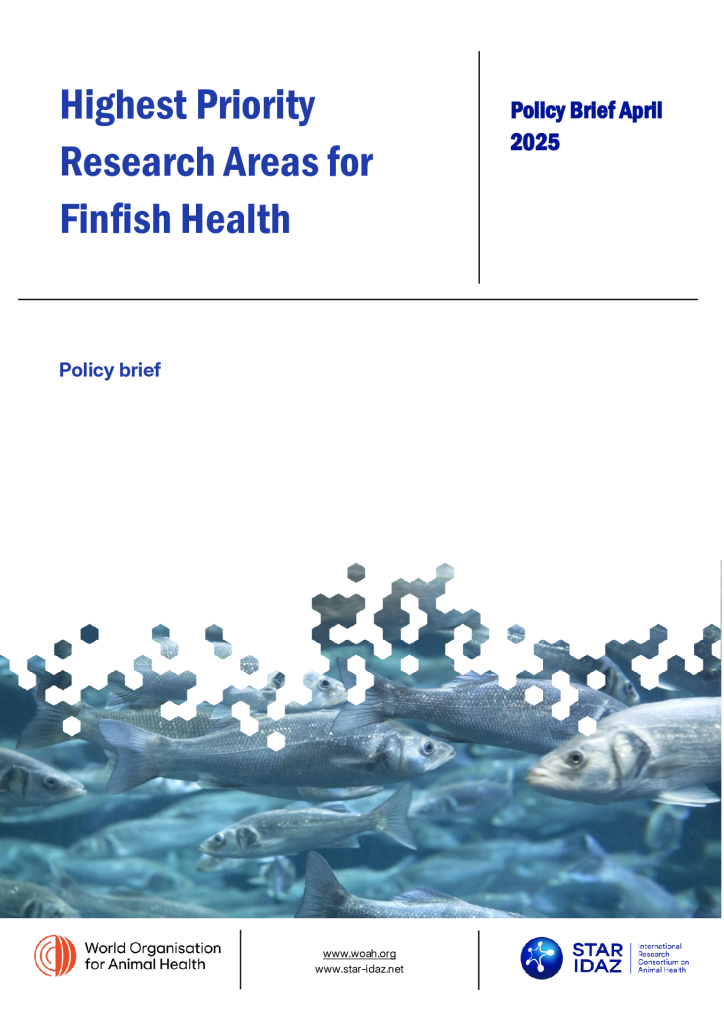STAR IDAZ Approach
Aquatic diseases pose significant threats to the health and sustainability of fish and other aquatic species, with wide-reaching impacts on global aquaculture and natural ecosystems. These diseases can spread rapidly through water systems, affecting wild populations and farmed species alike, leading to economic losses and ecological imbalances. STAR IDAZ IRC recognizes the critical importance of monitoring and researching aquatic diseases to protect aquatic biodiversity and ensure food security. Under the framework of the WOAH Aquatic Animal Health Strategy, STAR IDAZ IRC joined forces with the World Organisation for Animal Health (WOAH) to identify the highest priority research areas for advancing aquatic health research.
Information
-
WOAH Aquatic Animal Health Code
WOAH provides comprehensive information on various aquatic animal diseases, including prevention and control measures. The factsheets cover diseases affecting fish, mollusks, and crustaceans.
-
FAO Aquatic Factsheets:
The Food and Agriculture Organization (FAO) offers detailed factsheets on several aquatic diseases that impact aquaculture, including their symptoms, transmission, and management practices.
-
USGS: Aquatic Animal Health Program - U.S. Geological Survey (USGS):
The USGS provides factsheets on various aquatic animal diseases, particularly those affecting fish in the United States. The resource includes information on disease symptoms, diagnostics, and impacts on fisheries.
-
Australian Government: Aquatic Disease Field Guide app
The field guide aims to help people recognise diseases of significance to aquaculture and fisheries in Australia. This edition incorporates new and updated information gathered from an extensive review of the fourth edition. It now covers 53 aquatic animal diseases of significance to Australia that affect species of finfish, crustaceans, molluscs and amphibians.
Working group
Aquatic Diseases Working Group
In early 2025, STAR IDAZ and WOAH united the global aquaculture scientific community to identify the highest research priorities for improving the management of aquatic animal diseases worldwide. Through a global online consultation, over 440 experts from 187 countries were invited to participate. The initiative received an impressive response rate (43%, n=184), with contributors sharing insights via a survey focused on key aquaculture sectors: finfish, molluscs, crustaceans, and amphibians. To build on these findings, a dedicated workshop was held at the WOAH Headquarters, bringing together more than 40 international experts. The discussions focused on advancing aquaculture research with an emphasis on finfish, the most productive aquaculture sector globally in terms of both volume and value.
Key People
Ruth Zadoks,
University of Sydney Australia
Mohamed E Abou El Atta,
Central Laboratory for Aquaculture Research (CLAR) Egypt

Olanike Adeyemo,
University of Ibadan Nigeria
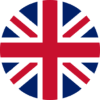
David Bass,
Centre for Environment, Fisheries and Aquaculture Sciences (CEFAS) United Kingdom
Ole Bendick Dale,
Norwegian Veterinary Institute Norway
Edgar Brun,
Norwegian Veterinary Institute Norway

Irene Cano Cejas,
Centre for Environment, Fisheries and Aquaculture Science (CEFAS) United Kingdom
Siow Foong Chang,
Animal & Veterinary Service National Parks Board Singapore
Kevin William Christison,
Department of Forestry, Fisheries and the Environment, Directorate: Aquaculture Research and Development South Africa
Kimberly Churchwell,
Gates Foundation United States
Jérôme Delamare-Deboutteville,
WorldFish Center Malaysia
Ha Thanh Dong,
Asian Institute of Technology Thailand
Alicia Gallardo Lagno,
University of Chile Chile
Carlos Augusto Gomes Leal,
Federal University of Minas Gerais - UFMG Brazil
Larry Hammell,
Atlantic Veterinary College Canada
Armando Heriazon,
International Development Research Centre Canada
Nelly Isyagi, ,
African Union – InterAfrican Bureau For Animal Resources (AU-IBAR) Kenya
Theofanis Kanellos,
Group Innovation and Corporate Alliances (CEVA) Global
Hyoung Jun Kim,
Ministry of Oceans and Fisheries Republic of Korea

Mario Latini,
WOAH Sub Regional Office Central Asia Republic of Kazakhstan

Hong Liu,
General Administration of Customs China

Nikki Mackie,
UK Research and Innovation (UKRI) United Kingdom
Aldo Maddaleno,
Universidad de Chile Chile
Krishna Thakur,
University of Prince Edward Island Canada

Kim Thompson,
Moredun Research Institute United Kingdom
Anna Toffan,
Istituto Zooprofilattico Sperimentale delle Venezie Italy
Nathalie Vanderheijden,
EU Partnership AHW Germany
Niccoló Vendramin,
Technical University of Denmark Denmark

Qing Wang,
Chinese Academy of Fishery Sciences China

Steve Wilson,
GALVmed United Kingdom
Nicholas Moody,
CSIRO Australian Animal Health Laboratory (AAHL) Australia

Mary Nkansa,
Ministry of Fisheries Ghana

Ben North,
PHARMAQ, Zoetis United Kingdom
Francesc Padrós,
Universitat Autònoma de Barcelona Spain
Le Hong Phuoc,
Southern Monitoring Center for Aquaculture Environment and Epidemics Vietnam
Francisca Samsing Pedrals,
University of Sydney Australia
Heike Schütze,
Friedrich Loeffler Institute (FLI) Germany
Mwansa M. Songe,
University of Zambia Zambia

Sophie St. Hilaire,
City University of Hong Kong China
Saraya Tavornpanich ,
Norwegian Veterinary Institute Norway
Dr Bruno Goddeeris, Belgium
Dr Ruth Zadoks, Australia
Dr Valeria Mariano, Italy
Reports
Reports and outcomes from meetings and workshops
Research roadmaps and gap analyses
Gap analysis summary
At STAR IDAZ, we recognize the increasing importance of tackling aquatic animal diseases to support the growth of sustainable aquaculture. Although a formal roadmap has not yet been established, thanks to global consultation and through collaborative expert discussions, the highest-priority research gaps for finfish have been identified. Details of research priorities for finfish are outlined in the reports and include emerging diseases, antimicrobial resistance (AMR), diagnostics, vaccines, and biosecurity. These priorities aim to guide future research towards a healthier, more sustainable, and innovative aquaculture industry.
Projects
Displaying 4 of 19 projects
VIEW ALL PROJECTSNAHLN: MAINTAIN LEVEL 1 STATUS AND INCREASE NAHLN CAPABILITIES AND CAPACITY IN ADDRESSING AN ADVERSE ANIMAL HEALTH EVENT SUCH AS MAY OCCUR WITH AN EMERGING DISEASE DETECTION OR FOREIGN ANIMAL DISEASE
Planned Completion date 31/08/2023
 United Kingdom
United Kingdom
ELUCIDATING THE ROLE OF BETA DEFENSINS IN STRESS RESPONSE IN RAINBOW TROUT
Planned Completion date 30/06/2025
 United Kingdom
United Kingdom
NAHLN: MAINTAIN LEVEL 1 STATUS AND INCREASE NAHLN CAPABILITIES AND CAPACITY IN ADDRESSING AN ADVERSE ANIMAL HEALTH EVENT SUCH AS MAY OCCUR WITH AN EMERGING DISEASE DETECTION OR FOREIGN ANIMAL DISEASE.
Planned Completion date 31/08/2024
 United Kingdom
United Kingdom
STRUCTURAL CHANGES IN FISH AND SEAFOOD MARKETS
Planned Completion date 28/02/2023
 United Kingdom
United Kingdom

